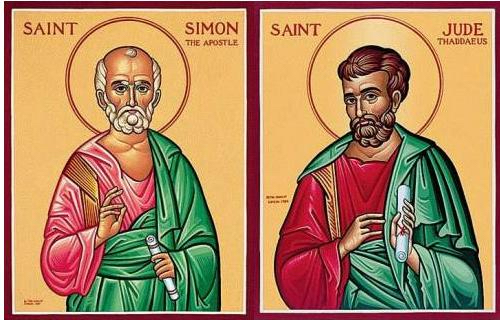St Simon & St Jude
Grafton Cathedral
28 October 2018
[video]
During the course of the year, we celebrate numerous holy people: apostles and prophets, martyrs and teachers, missionaries and social reformers.
Chief among the saints that we honour is Mary, Mother of the Lord. For many centuries she was the only woman to have a ‘red letter’ feast day, and indeed she has several feast days.
Even among Australian Anglicans we find quite a list of holy days for Mary:
February 2 Purification of the Blessed Virgin
March 25 Annunciation to the Blessed Virgin Mary (Lady Day)
May 31 Visitation of the Blessed Virgin Mary
August 15 Falling Asleep of the Blessed Virgin Mary
September 8 Nativity of the Blessed Virgin Mary
December 8 Conception of the Blessed Virgin Mary
Happily, Mary the Magdalene now has a red letter feast day on July 22 after disappearing from Anglican prayer books between 1552 and 1928.
The Twelve Disciples are obvious candidates for celebration, as is St Paul. We celebrate the Twelve at various times of the year:
- Matthias (February 24)
- Phillip & James (May 1)
- Peter & Paul (June 29)
- James (July 25)
- Bartholomew (August 24)
- Matthew (September 21)
- Simon & Jude (October 28)
- Andrew (November 30)
- Thomas (December 21)
- John (December 27)
So today we focus on Simon and Jude, as this is their day!
Now let me summarise everything we know about these two people;
(silent pause)
Well, now that that is behind us, what are we going to do with a holy day for people about whom we know nothing at all?
We can deduce some general information about people like them with names like this at that time in history. But about these two individuals, we know nothing beyond the fact that they were listed among the Twelve.
Mind you, that is not bad!
None of us will ever make that list. Nor did Paul—or Mark, or Luke, or Barnabas. Nor James the bother of the Lord, nor even Mary herself.
 We can never be one of the Twelve, but we do have something in common with Simon and Jude: we are disciples of Jesus.
We can never be one of the Twelve, but we do have something in common with Simon and Jude: we are disciples of Jesus.
They were there at the beginning: walking around the dusty road of Galilee, listening to Jesus, watching him, learning to look for signs of God’s kingdom, and—in the end—running away in fear when Jesus was arrested and killed.
Those people who first paid attention to Jesus are critical for us as people of faith. Had they abandoned the dream after Easter there would be no Christian faith. We really do not know why they kept the faith, but they did. And because they did, we can as well.
Simon and Jude were disciples.
“Disciple” (mathētēs) is an interesting term in earliest Christianity. It is a word never used by Paul nor any of the NT writers other than the 4 Evangelists. “Disciple” occurs 261 times, but only in the Gospel and (10% of the time) in the Acts of the Apostles, which was written by the same person who wrote the Gospel of Luke.
There are similar statistics for the Greek word (akolouthein), “to follow”. The word occurs 90 times in the NT: 79 times in the gospels, 4 times in Acts, 6 times in the Book of revelation, and just one other time—in 1 Corinthians (where it refers to the Jewish legend of a miraculous rock that followed the Israelites as they wandered in the desert).
One last data point. The situation is entirely reversed when we consider the word, “apostle” (apostolos). The term is virtually unknown in the Gospels (except for Luke who uses it 6 times), but very common—and very significant—in the epistles.

Paul was always demanding people recognise his authority as an apostle, but he never once describes himself—or them—as disciples. Yet surely that is our deepest identity as people of faith.
“Apostle” is a word linked to authority and leadership. “Disciple” is a word without those associations, but it is especially and distinctively associated with Jesus himself. We only find this word being used in the Gospels.
To be a disciple is to get to the heart of what Jesus was doing: calling people to embrace his vision of God’s reign, to turn to God, to set aside other responsibilities, and to do what Jesus does: to proclaim, to heal, and to cast out evil.
There is no status in this call. No privilege and no authority. No scheming to sit on the left hand or right hand of Jesus. To be a disciple is to be called into serving others, meeting their needs, and setting aside any privilege or status we may otherwise have enjoyed.
Simon and Jude were honoured—most likely only after their deaths—as apostles and martyrs, but their real significance is simply that they were disciples.
Like them, we discern the call of God in Jesus of Nazareth.
Jesus calls us to follow him and be there for others.
Simon and Jude—who are always listed in the tenth and eleventh place among the Twelve (only Judas Iscariot comes after them at #12)—did not leave a big impression in the memories of their peers.
Like them today we can seek the grace to hear and respond to the call of Jesus, and the courage to waste our lives for the sake of other people. We may never become famous, but we know we can be faithful. And what can be more important than that?
